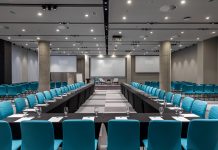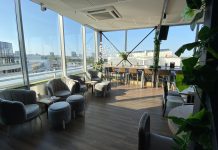Everyone knows what a meeting is.
Large or small, they are a means of bringing people together to share information, generate ideas,
and make business connections. When you think of being “green” or environmentally responsible, recycling is usually the first thing that comes to mind. A green meeting or event goes beyond recycling.
Green meetings have been defined as a “meeting that incorporates environmental considerations throughout all stages of the meeting in order to minimize the negative impact on the environment.”
Greening an event encompasses all aspects of the planning process. By making choices at every planning level, from site selection to serving condiments like ketchup and sugar from bulk containers, the environmental impact of the event can be significantly reduced. It means taking steps to minimize waste through recycling, composting and avoiding disposable items, to decrease energy consumption, and to use products with post-consumer recycled content and food that is organic, local or fair trade. Green meetings also incorporate social aspects such as charitable donations and projects that give back to the community.
Why is it important to make my meeting green?
A small meeting may not seem important, after all what difference does a few dozen cups and
napkins make? But think about what happens when it is on a large scale. For example, during a typical five day conference, 2,500 attendees will use 62,500 plates, 87,500 napkins, 75,000 cups or glasses and 90,000 cans or bottles. Plus there are all the greenhouse emissions from people traveling to and from the conference and paper and plastic waste from conference handouts.
Now multiply this by the thousands of meetings produced each year worldwide and the environmental impact is staggering. So it is important to make changes whenever possible, because every meeting can make a difference and reduce its environmental and social impact.
Source: www.meetgreen.com
Green meetings as a part of CSR
Businesses and leisure travellers have grown to expect to be able to put a value on the impact of their travel – indeed many companies are now committed to doing so as part of their CSR policy. Increasingly they will choose to work with suppliers who can satisfy this demand.
As businesses increasingly focus on the CSR (Corporate & Social Responsibility), corporations are looking to use greener venues and companies/hotels which take care of eco standards are more likely to get big corporate clients. It makes sound commercial sense as much as it makes sound ethical sense. Some of the things that venue/hotel can do to make meetings more green are: environmentaly-friendly presentation materials, paperless event proposals, meeting rooms with natural light, the use of fair trade coffee* and seasonal fruit, etc.
Corporate social responsibility (CSR) sections are becoming increasingly common in request for proposal (RFP) programs, evidence that carbon emission measurement is a growing factor for today’s corporations when arranging preferred hotel programs.
Whether travelling for business or pleasure an increasing percentage of us are concerned to consider the environmental impact of our journey, or to ensure that our purchasing decisions are taken with an eye to the environmental impact of our actions.
*Fair trade coffee is coffee which is purchased directly from the growers for a higher price than standard coffee. Fair Trade coffee is one of many Fair Trade certified products available around the world. The purpose of fair trade is to promote healthier working conditions and greater economic incentive for producers. Growers are guaranteed a minimum price for the coffee, and if market prices exceed the minimum, they receive a per pound premium. Fair Trade coffee has become increasingly popular over the last 10 years, and is now offered at most places coffee is sold.




































 Srpski
Srpski English
English